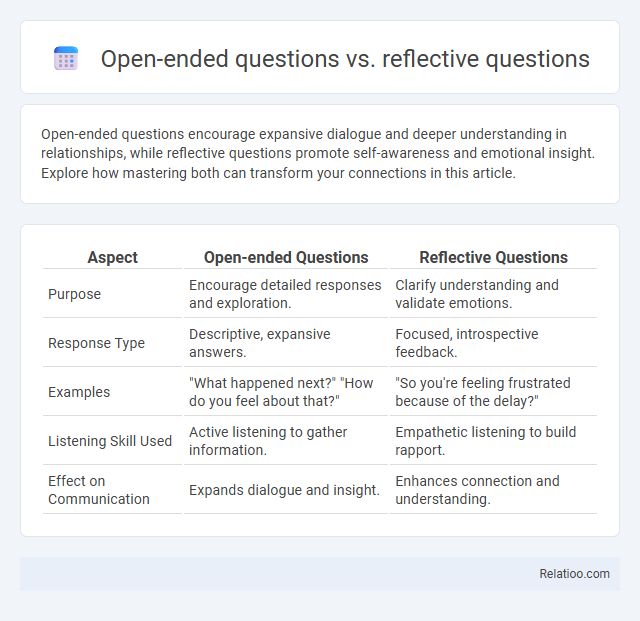Open-ended questions encourage expansive dialogue and deeper understanding in relationships, while reflective questions promote self-awareness and emotional insight. Explore how mastering both can transform your connections in this article.
Table of Comparison
| Aspect | Open-ended Questions | Reflective Questions |
|---|---|---|
| Purpose | Encourage detailed responses and exploration. | Clarify understanding and validate emotions. |
| Response Type | Descriptive, expansive answers. | Focused, introspective feedback. |
| Examples | "What happened next?" "How do you feel about that?" | "So you're feeling frustrated because of the delay?" |
| Listening Skill Used | Active listening to gather information. | Empathetic listening to build rapport. |
| Effect on Communication | Expands dialogue and insight. | Enhances connection and understanding. |
Introduction to Open-Ended and Reflective Questions
Open-ended questions encourage expansive responses by inviting detailed thoughts and explanations, fostering deeper engagement and richer information gathering. Reflective questions prompt individuals to think critically about their experiences or feelings, enhancing self-awareness and insight. Both types of questions are essential in communication, with open-ended questions driving exploration and reflective questions supporting personal connection and understanding.
Defining Open-Ended Questions
Open-ended questions invite detailed, thoughtful responses by encouraging exploration beyond simple yes/no answers, making them essential for meaningful conversations and critical thinking. Reflective questions prompt you to consider your thoughts or feelings, deepening self-awareness and personal insight. Understanding the definition of open-ended questions helps you engage more effectively in dialogues that foster creativity and problem-solving.
Understanding Reflective Questions
Reflective questions encourage deeper self-exploration by prompting individuals to consider their feelings, values, and experiences, enhancing self-awareness and critical thinking. Unlike open-ended questions which invite broad responses, reflective questions target personal insight and meaning-making, facilitating emotional and cognitive processing. This distinction makes reflective questions essential tools in therapy, coaching, and education for fostering growth and understanding.
Key Differences Between Open-Ended and Reflective Questions
Open-ended questions invite Your detailed responses by encouraging exploration and elaboration on various topics, fostering broader conversations. Reflective questions focus specifically on introspection and self-examination, prompting deeper insight into Your thoughts, feelings, and experiences. The key difference lies in purpose: open-ended questions seek expansive answers, while reflective questions aim to cultivate self-awareness and personal growth.
Benefits of Using Open-Ended Questions
Open-ended questions encourage Your deeper thinking and detailed responses by allowing exploration beyond simple yes or no answers. They foster meaningful conversations, enhance critical thinking, and improve problem-solving skills through expansive dialogue. Utilizing open-ended questions promotes greater engagement and understanding in any communication setting.
Advantages of Reflective Questions in Communication
Reflective questions enhance communication by encouraging deeper self-awareness and critical thinking, helping you gain insights into your thoughts and feelings. Unlike open-ended questions that gather information broadly, reflective questions promote active listening and empathy, fostering stronger connections and trust. Your ability to engage in reflective questioning can lead to more meaningful and productive conversations.
When to Use Open-Ended Questions
Open-ended questions are essential for gathering detailed information and encouraging expansive thinking, making them ideal during brainstorming sessions or initial interviews where broad insights are needed. Reflective questions serve a different purpose by prompting individuals to think deeply about their experiences or feelings, often used in coaching or therapy to enhance self-awareness and emotional insight. When to use open-ended questions depends on the goal of the conversation; they are most effective when the aim is to explore ideas, uncover motivations, or stimulate creative responses without limiting the respondent's answers.
Situations Best Suited for Reflective Questions
Reflective questions are best suited for situations where deeper understanding and personal insight are needed, such as during counseling, coaching, or self-assessment discussions. These questions encourage You to explore your feelings, thoughts, and motivations, promoting self-awareness and meaningful reflection. Unlike open-ended questions that elicit broad responses, reflective questions target introspection and clarification in complex emotional or decision-making contexts.
Tips for Crafting Effective Open-Ended and Reflective Questions
Effective open-ended questions encourage expansive responses by starting with "how," "why," or "what," prompting detailed insights and critical thinking. Reflective questions deepen understanding by requiring individuals to connect experiences with emotions and lessons, enhancing personal growth and self-awareness. To craft impactful questions, focus on clarity, avoid leading language, and tailor prompts to stimulate thoughtful reflection and rich dialogue.
Conclusion: Choosing the Right Question Type for Your Goals
Open-ended questions encourage detailed responses, promoting broad exploration and creativity, while reflective questions prompt deeper thinking and self-awareness, often leading to insightful personal discoveries. Choosing the right question type depends on your goal: use open-ended questions to gather diverse perspectives and reflective questions to foster introspection and critical analysis. Tailoring your approach ensures more meaningful conversations and effective outcomes aligned with your objectives.

Infographic: Open-ended questions vs Reflective questions
 relatioo.com
relatioo.com